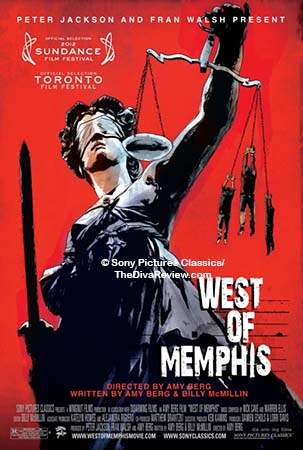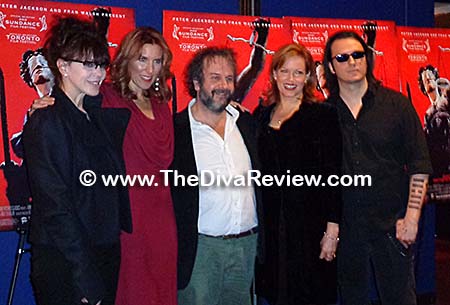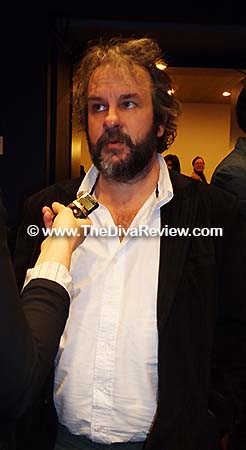|
 Three
babies are in the water. Gone missing from their small Arkansas town,
the trio of eight-year-old boys is discovered cold and lifeless in a
creek in unimaginable fashion; nude, hog-tied and sexually mutilated.
So begins a nightmare from which many will never wake. Three
babies are in the water. Gone missing from their small Arkansas town,
the trio of eight-year-old boys is discovered cold and lifeless in a
creek in unimaginable fashion; nude, hog-tied and sexually mutilated.
So begins a nightmare from which many will never wake.
On the
occasion in 1993, three teenagers, Damien Echols, Jason Baldwin and
Jessie Misskelley were accused of the killings at Robin Hood Hills,
based mostly on suspicion and circumstantial evidence. The mood of the
populace at the time was high and vengeful, so these misfits, including
and particularly the black-clad, Aleister Crowley-influenced Goth boy,
Echols, were easy scapegoats for a rushed investigation that just wanted
to close the book on this unthinkable crime. That there was no hard
evidence linking the trio to the murders of Christopher Byers, Steven
Branch and Michael Moore and the fact that many of the eyewitnesses who
claimed to put them at the scene were complete liars seemed of no
difference so long as there was someone to blame.
That might’ve been
the end of the story and the end of the line for the boys, who were
sentenced to life in prison and Echols to death, but for their
connection to a pair of documentarians, Joe Berlinger and Bruce Sinofsky,
who in 1996, exposed the miscarriage of justice and presented alternate
theories as to who the actual murderer of the boys might’ve been. The
first of the three documentaries, Paradise Lost, immediately captured
the worldwide attention and made the arrested teens, who were dubbed the
“West Memphis Three” a cause célčbre, which soon found actors like
Johnny Depp and musicians like Eddie Vedder organizing benefits for the
imprisoned youths.
Another famous person put his money where his mouth
was: Director Peter Jackson of the enormously successful Lord of the
Rings trilogy and his partner, screenwriter Fran Walsh, viewed the doc
and immediately reached out to Echols’ determined bride, Lorri Davis, to
offer their assistance in her efforts to save her husband’s life. West
of Memphis is an all-encompassing look at the murder, the trial and the
aftermath as it currently stands, directed by documentarian Amy Berg and
produced by Jackson and Walsh, who, up until the conditional release of
the accused young men earlier this year, had kept their involvement with
the case silent. One might wonder what the necessity of this film is
considering the intensity of Berlinger and Sinofsky’s investigations?
Co-produced by Damien Echols, West of Memphis makes itself
distinguished not only by being the most up-to-date look at its subject,
but by giving the viewer access to some of the most sensitive and
germane facts and evidence yet seen.
West
of Memphis serves as a nutshell version of a long, strange nightmare
experienced by both the families of the murdered boys and the accused
teens. We see the horrifying police photos of the children after their
discovery in the creek (though as tastefully as possible). We
are offered some alternate theories; including the stunningly simple
possibility that much of the physical trauma caused to the boys’ bodies
may simply have been due to the wildlife in the creek where they were
left. Jackson and Walsh discuss their willingness to give Lorri Davis a
blank check to do whatever was needed to gather evidence to prove that
her husband and the other two suspects could not have been the
murderers. Besides their financial support, the New Zealand filmmakers
went so far as to provide access to some of the top scientists in the
DNA field to disprove Arkansas’ case. They hired a tenacious detective
whose taped investigations of the victims’ families unearth a chilling
prospect for a new suspect. Berg also highlights the pen-pal
relationship between Davis and Echols that bloomed into a bond of love
and strength grown over fifteen years of untiring resolve.
The
disparate opinions of the three imprisoned men who are offered their
freedom at the price of their innocence is a tense subtext to the story
of their ordeal and the resolution to their story is far from ideal;
being released with their felony convictions still intact.
Besides this
new and broader access, what Berg’s documentary does brilliantly is get
deeper into the emotional toll the murders have had on the families of
the victims; those three small boys whose sad story is often lost in the
urgency to get the wrongly accused teens released. The aimlessness of
the now-adult younger sister of one of the boys is haunting because it’s
plain that many of her troubles have the murder and the events around it
at their root. The mothers who still have their sons’ clothes hanging
up in the closet nearly two decades after their deaths is
heartbreaking. West of Memphis gives us a sense of the emotional
rollercoaster these women have endured, in not only the loss of their
children, but being swept up in misdirected anger at the three wrongly
accused teenagers only to discover the closure they hoped for was
illusory and that as yet, no one has truly been brought to account for
the horrible crime.
While the display of tireless dedication in the
pursuit of exoneration for the West Memphis Three and the message of
fighting against injustice no matter the odds are certainly inspiring,
the movie is terribly sad. Not only is the horrible unfairness of the
waste of eighteen years of three young men’s lives inside a
maximum-security prison, topped off with the Pyrrhic victory of the
equivalent of a plea bargain that upholds their guilty status, but as it
stands, the boys’ murderer, the person who committed this horrible,
unthinkable thing, still walks free.
For
its intelligent storytelling, wise use of access and evidence and mostly
for its emotional depth, which separates the documentary from the other
films on the murders in Robin Hood Hills, West of Memphis is required
viewing.
~ The
Lady Miz Diva
December 14th, 2012
Hey all, as an added bonus,
here’s our chat with the folks behind
West of Memphis, subject/producer Damien
Echols, director Amy Berg
and producer/supporter Peter Jackson
of Lord of the Rings fame.
Dig it!
West of Memphis New
York Premiere Red Carpet Interviews

Producer Peter Jackson
 The
Lady Miz Diva: What was it originally that caught your eye about the
case? You live in New Zealand and between our two hemispheres there
must be so many instances of unjust prosecution, why did you choose to
get involved with the West Memphis Three? The
Lady Miz Diva: What was it originally that caught your eye about the
case? You live in New Zealand and between our two hemispheres there
must be so many instances of unjust prosecution, why did you choose to
get involved with the West Memphis Three?
Peter Jackson:
Fran and I saw the original Paradise Lost documentary in New Zealand in
about 2004, 2005. It was about 8 years after the convictions and we
were horrified when we did a bit of research to find out that the guys
were still in jail and the case was sort of in stasis. Nothing was
going on. I think this made us angry.
It’s not that we want to be
crusaders for American justice -- I mean we’re a couple of New
Zealanders living a long way away -- but it just felt like these were
three very poor kids with no resources to help defend themselves. The
state has everything on its side; it created a fictitious scenario which
sounds like it’s something out of the Middle Ages, involving satanic
worship and ritualistic murder. The full moon was even involved
according to the state’s story. So, you kind of think, ‘Well, these
guys need help,’ and you just want to help the underdog, really. Then
it became personal because we became friendly with Lorri {Davis,
Echols’ wife} and it became a very personal thing at that point, {she}
was just trying to save her husband’s life.
LMD: Apparently
you’d been involved with the West Memphis Three case for a long time
without anyone knowing. Why did you choose now to go public?
PJ:
We didn’t really have our involvement known until after Damien got out
of jail and at that point I had started to talk about it on the internet
a bit, and then the fact that we were working with Amy on the
documentary, we started to talk about it, as well. We kept our
involvement secret for about seven or eight years.
Director Amy Berg
 LMD:
Since there are the three previous documentaries on the West Memphis
Three by Joe Berlinger and Bruce Sinofsky that are so well known, what
did you want your film to add to the story? LMD:
Since there are the three previous documentaries on the West Memphis
Three by Joe Berlinger and Bruce Sinofsky that are so well known, what
did you want your film to add to the story?
Amy Berg:
I think that’s such an interesting question. When we were contacted
there was a guy on death row and there were two men serving life
sentences and there hadn’t been a documentary in almost 10 years. We
were wanting to see justice served, so, of course, the more the merrier.
Yes, we wanted justice and nothing was happening. There was a film
that came out 10 years earlier and they were still sitting in prison.
LMD: What sort of
interaction was there with Lorri, Damien’s wife?
AB:
Regular, just regular interaction.
LMD: Did she have
any involvement in the way the film was presented at all?
AB:
Oh no, she was there for research. I mean, she was there for me when I
needed her. It was definitely a film I was working on as the director.
I was following my own journey, but she was there for research, as were
Fran and Pete, all the way.
LMD: I understand
that this might not be the final chapter of the story?
AB:
No. They are still not free. They have triple child murder convictions
on their records right now.
Damien Echols
 LMD:
Just speaking with Amy Berg, apparently this is not over. There is
still more to this case? LMD:
Just speaking with Amy Berg, apparently this is not over. There is
still more to this case?
Damien Echols:
Well, for us, this has never been just about the documentary; it’s about
the case. The documentary is sort of a side effect of that. We’re
still pushing forward, doing everything we can. We want to be
exonerated. We want the person in prison who belongs in prison and we
want the people who did this to us held responsible. So, this
documentary is just a bigger part of that, part of the push to get those
things done.
LMD: I think there
are a lot of people who might’ve looked at your case and thought, ‘Well,
this wouldn’t have happened if it wasn’t in the deep South,’ referring
to being persecuted for your gothic looks and interest in magic, but I
feel like this is one example of larger injustices.
DE:
Absolutely. I mean, people say, “That would’ve never happened if you
would have lived in New York,” and I say, “Well, tell that to the
Central Park Five.” It happens everywhere, it’s just easier
for it to happen in some places and it happens more often in some
places, but it is possible and it does happen everywhere in the US.
~ The Lady Miz Diva
December 7th,
2012
For those who would
like to help the West Memphis Three receive exoneration which will erase
the child murder convictions from their records, please contact Arkansas
District Attorney, Scott Ellington, 870-932-1513 to ask him to reopen
the case.

© 2006-2022 The Diva Review.com
|
